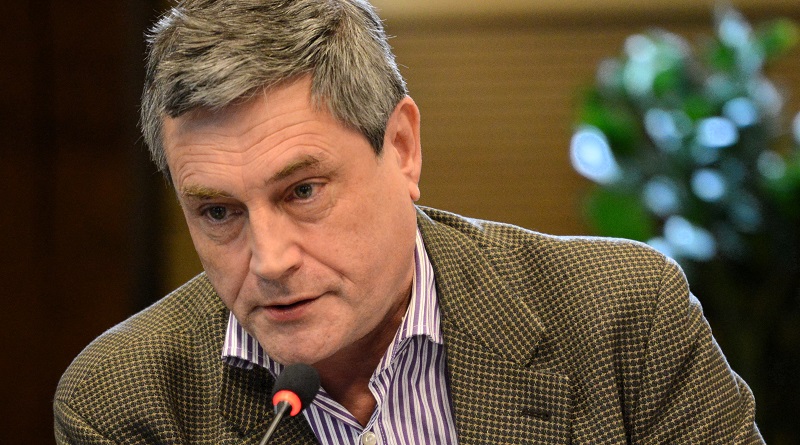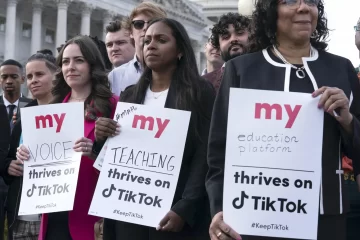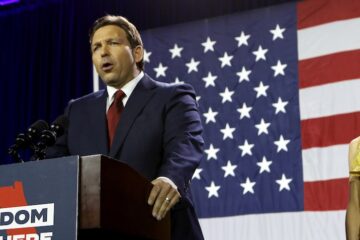It is often said that those who forget the past are doomed to repeat it. Perhaps our forgetting of history is what has returned us to Russian posturing reminiscent of the Cold War, European populism reminiscent of the 1930s, and US-China relations reminiscent of Athens and Sparta. It is this problem of historical amnesia that Professor Christopher Coker hopes to resolve. With books, busts, and mementoes from the worst events that humanity has produced, Professor Coker makes it impossible for his students to overlook the horrors of history. It is only his counterbalancing memorial to the intellectuals, the revolutionaries, and, of course, the Allies that leaves his students with some hope. As I was coming to him to discuss the challenges the world faces in 2018, this all formed a rather dramatic backdrop.
The new year has not brought a new start for a tired and divided world. Tensions still run high in Korea, the fighting still rages in Syria, a humanitarian crisis still unfolds in Myanmar, instability still plagues Venezuela, Brexit still looms, and Trump still tweets. I sat down with Professor Coker to hear his take on the state of the international order. We jumped from continent to continent and issue to issue before he concluded: “You, however, may be more optimistic!” I cannot say that I am.

SP: I’d like to get the bad stuff out of the way first. There are a number of doomsday scenarios that appear increasingly viable: nuclear war in Korea, a real confrontation with Russia or China, a major terrorist attack, a catastrophic natural disaster, and more. Is the international order prepared to handle these challenges in 2018?
CC: It’s all bad stuff. The international order is more riven by factionalism with very different interest groups fighting out their corner than I’ve ever remembered it in the forty years that I’ve been teaching. That might be ascribed to ageing — I’m thinking back to a golden age that never existed. It might be ascribed to the fact that we had the Cold War era where all the themes were nicely delineated. In the post-Cold War era, we had triumphalism. Now we’re entering a post-Western moment or a post-American moment that I find very difficult to adjust to maybe because I come from a different generation that grew up with those certainties. I am always reminded of what John Updike told the students at Amherst in 1993 when he gave the commencement address: the Cold War had been a novel and the post-Cold War era is a set of short stories. History once had a shape; now it was pretty shapeless.
And what does it mean that the international order is a set of short stories?
It means that the world is faced by a kaleidoscope of challenges, and we no longer have the one overriding mission of the Cold War: the containment of the Soviet Union. We still haven’t got a novel. I think George Bush tried to produce a novel called the War on Terror to which everything else was subsumed — and look at the disastrous consequences of that. So we have to make do with a set of short stories most of which are about conflict in one form or another.
"The Cold War had been a novel and the post-Cold War era is a set of short stories. History once had a shape; now it was pretty shapeless."
But perhaps we have a novel in the making with AfD, National Front, UKIP, and Trump. Is it possible that populism is the new novel?
No, because the populist movements are precisely that: populist. They have no real leaders, they have no manifestos, and some have no real agenda. If you compare this with the 1930s, fascism had a very firm idea of a country’s ‘destiny’. It had a generic ideology, social Darwinism, and a main theme, the struggle for survival, and it engaged in zero-sum competition. And its leaders, however much we may not like them, were not buffoons. Hitler was one of the most gifted men of the twentieth century; with Lenin, he was its greatest revolutionary. None of this is true of Nigel Farage, Marine Le Pen or even Donald Trump.
In this “kaleidoscope of challenges,” as you call it, it appears easy for new challenges and challengers to arise. One prominent one has been Mohammed Bin Salman. What do you make of his project for Saudi Arabia?
The current system in Saudi Arabia is totally unsustainable. There will be a breakdown of the Saudi regime if things are not taken into hand — although, I mustn’t be too Western about this. I remember a British ambassador to Saudi Arabia telling me: “Every year a parliamentary delegation comes out and the last question they ask before they leave is when’s the regime going to collapse? And I tell them: the next year. When the next parliamentary delegation comes the year after, I give them the same answer.” What’s interesting is that you have a guy now who’s running Saudi Arabia who actually fears this may come true – if not the day after tomorrow, then the day after that — so you have to get things right.
He knows the oil is running up, so that’s why he’s into high tech: the vision of a city controlled by robots. He realises that the clerics are holding the country back. He wants not to liberalise the system, but in a more Nietzschean sense to ‘revalue’ the traditional values — you make them relevant to the new context. That’s what the Wahhabists cannot understand or, if they do, fear most. They’re still thinking in the language of the 18th century when they first emerged. And this he realized is a recipe for total disaster for the present regime.
And do you think he’ll be successful?
No, he’s a man in a hurry and men in a hurry never last very long. That is why incidentally he never leaves the country (although he is currently on his first trip abroad) and spends most of his time in the Defence Ministry.
He is also playing a dangerous game with Iran that the region certainly doesn’t need. How do you make sense of the rising tensions between the region’s major powers?
At the end of the day, if there were to be a conflict between Saudi Arabia and Iran, you’d have to bet on Iran every time. Iran is a nation-state; Saudi Arabia is not. The Iranians have been around for 3000 years, the Saudi Arabians have been around since the 1920s. The Saudi armed forces are a joke (look at their performance in Yemen). The Iranian armed forces are not. They may be underfunded and they may underperform but they have a strong notion of Iranian nationality and the knowledge that their way of life is considerably older than that of their Arab neighbours.
We are lucky then that Iran is not yet nuclear.
Forty-two years and it still hasn’t succeeded in building a bomb. But does Saudi Arabia have nuclear weapons? Of course it does. They are stored in Pakistan ready to be flown to Riyadh.
I’ve never heard this.
Well, so I’ve been told. It was a reliable source.
"At the end of the day, if there were to be a conflict between Saudi Arabia and Iran, you'd have to bet on Iran every time"
The majority of nuclear concern still exists on the Korean peninsula, as President Trump continues to antagonise the world’s only rogue nuclear actor. What should we expect from North Korea in the new year?
Donald Trump doesn’t really care about South Korea. He’s worried about those missiles hitting the west coast of the United States. You have to remember that North Korea – in theory at least – has nuclear options that neither China nor Russia would exercise. In theory they might use nuclear weapons as diplomatic tools. They could explode a thermonuclear weapon somewhere in the Pacific creating an extraordinary environmental challenge. How would the US respond? They might explode a small nuclear weapon over the skies of a major Japanese city, but far enough in the atmosphere that there would be no major radioactive damage to the people below. And here is another even more unbelievable option: if they find themselves at war with the US and see that it is preparing to cross the frontier, they could explode a nuclear weapon on their own territory, which would create a radioactive zone through which the American forces couldn’t venture. So you have a regime which is like no other and which has nuclear weapons. Can it be deterred? That’s an open question. And what do we do if the regime employs nuclear weapons as a bargaining chip? The US has never had to confront that problem before.
But I wouldn’t want your readership to think that North Korea is the only ‘unconventional’ nuclear power. There is another: Israel. If you read Ron Rosenbaum’s book How the End Begins you will find that Israel is rumoured to subscribe to a doctrine called the “Samson Option”. Remember how Samson (the biblical Israelite judge) brings down the two pillars of the temple (to kill himself and the thousands of Philistines who had captured him)? In this case if you realise you are about to be eliminated from the map in an Iranian nuclear strike, you will have two responses. One of course is taking out what you can of Iran itself; the other is to target the countries that you hold responsible for allowing this to happen, i.e., the Western countries that were responsible for allowing the ‘first’ Holocaust to happen and which didn’t do enough to stop the ‘second’.
You’re saying that Israel would target—
Rosenbaum based his claim on interviews with Israelis who are closely connected with the security services.
Well, putting aside the problems of populism, the Middle East, and Korea, perhaps there’s some room for optimism today. As NATO keeps the Russians at bay in the Baltics, as the North and South Koreans march together under the same flag at the Olympics, as UKIP and AfD and Marine Le Pen suffer electoral defeats, it seems as if the liberal international order is fighting back. And perhaps that democracy is fighting back too.
You see, I have a fundamentally different reading from you. First, there is no fight back. Sanctions against Russia have been devastating for Russia, but the reality is that after a 230% increase in defence spending Russian forces are now operationally effective once again. Russia is back in the Middle East. It is active again in the west Balkans. China is pushing the US into a corner — threatening its ability to operate in the South China Seas, and planning to detach America’s allies from the US embrace — they have been successful with the Philippines. As for democracy itself, the AfD is now only 1% behind the SPD in the polls.
Anyway let me make a bold claim: democracy, to be effective, has to be oligarchic. And the oligarchs, whether they’re to the left or to the right, are a political class. What does the Athenian ‘democratic’ leader Pericles say in the famous oration that Thucydides gives him: “We, your masters, submit ourselves to the laws which we ourselves introduce.” We your masters, it can’t be franker than that. But Athens is a ‘democracy’ which means that different oligarchs have their own ‘popular’ base and vie for power. So if you see democracy as something of a fiction, you will recognize that the political class has always managed to present a united front on the things that really matter – call it cross-party or bipartisan support. And that is what has broken down – in the US with the parties at each other’s throats (they can’t even keep the government going); with Brexit in the UK and let us see how long the Grand Coalition lasts in Germany.
Well if it’s not about democracy, then how is the oligarchy holding up?
The oligarchs are also losing their self-belief and with it, their self-confidence. This is why I think democracy is in trouble in so many countries, and the country that perceives this is China, and the country that is exploiting it is Russia. China is, despite party cronyism, in its own mind the ultimate oligarchic (i.e. meritocratic) state. It believes that democracy is on the wrong side of history. And it may be right, but then as the American philosopher Richard Rorty once said: just because the next three billion people coming into the world may have no interest in the ideas of John Stuart Mill is no reason why you should stop reading him — any more than St Augustine was persuaded by the collapse of the Western Roman Empire to abandon his own belief in the truth of Christianity. He just told a story that served its purpose of comforting the faithful: the City of God was more important than the City of Rome. You, however, may be more optimistic!


